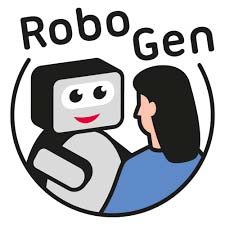Caring Robots // Robotic Care
Caring Robots // Robotic Care is a 5-years project, started in 2022, funded by the FWF #Connecting Minds program.
It involves 4 key researchers from TU Wien and one from University of Salzburg. Our goal is to develop and implement novel and desirable roles of robotic technology that proof useful, safe, meaningful, and wanted.
We aim for a participatory, open and reflective design process that involves a broad range of stakeholders from the care sector, with the ultimate goal to create desirable technological futures of care rather than merely acceptable ones. The gained insights shall contribute to a novel ethically aligned design approach for robotic care technology.
MAXimizeMe

XXLMontage für alle (Diversitätfördernde Individualisierung von Arbeitssystemen in der industriellen Baustellenmontage):
MAXimizeMe is a 2-years project, started in 2021 funded by Digifonds. Within MAXimizeMe we aim to achieve a better understanding of how aspects, such as age, gender, education or socioeconomic background impact the interaction with (autonomous) work systems in manufacturing or assembly.
The result of MAXimizeMe will be a collection of diversity-sensitive design guidelines that take into account relevant aspects for workforce allocation, work execution and resource provision in industrial site assembly in such a way that all employees can perform their work activities as long as possible, in a targeted manner and with optimized quality and efficiency.
RoboGen

RoboGen is a 3-years project, started in 2018 funded by the FGG (FemTech project).
The goal in RoboGen is to develop a prototype with a learning agent that, through feedback from users, makes gender-sensitive options accessible to all users and thus enables gender-sensitive human-robot interaction. The beneficiaries are senior citizens of 50+ and people with chronic diseases (mainly diabetes and hypertension).
Technologically, the focus of the project is on the upcoming, low-priced social robots in a price range around € 1,000, which are also affordable for “ordinary citizens”.
Shared Space

Exploring Long-Term Human-Robot Interaction: What makes people accept or reject companion robots?
SharedSpace is a 3-years project, started in 2018 funded by the FWF (Elise Richter programme). The working hypothesis of this project is that the interaction of lay people with a social companion robot (in this project the commercially available robot Anki Vector) changes over time and that its adoption and acceptance differ in terms of the socio-demographic qualities of the involved households.
TrustRobots Doctoral College

From September 2018 TU Wien has established an interdisciplinary Doctoral College (DC) on “Trust in Robots – Trusting Robots” to foster cutting-edge research in robotics and AI at the TU Wien. The main objective of the DC is to comprehensively analyse “trust” in the context of robot technology from various perspectives including but not limited to social sciences and economics, computer science and mathematics, electrical and mechanical engineering, and architecture.